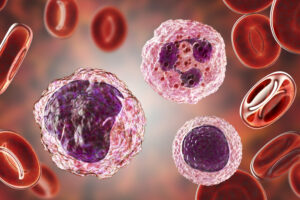Leukoreduction during plateletpheresis is routinely performed to prevent alloimmunization and febrile reactions when platelets are transfused. In 1988, the U.S. FDA limited platelet donations to 24 per year per donor due to possible lymphocyte depletion. This guidance was removed in 2007 due to a lack of clinical evidence. The effect of frequent plateletpheresis, however, remains unclear. To assess the clinical significance of frequent plateletpheresis, the immune response to novel antigens—the quadrivalent meningococcal conjugate vaccine—was assessed in donors naïve to the vaccine. During the study, pre- and post-antibody titers against meningococcal polysaccharide antigens (from the A, C, W and Y strains) from 102 platelet donors (mean age, 61 years; 69% male; median donations in last 365 days, 14) were measured. The CD4+ T cell counts were inversely proportion to the number of platelet donations; 34% of study donors had a CD4+ T cell count <350/µL and 14% with counts <200/µL. Lower CD4+ T cell counts, however, were not associated with lower quadrivalent meningococcal conjugate vaccine responses. Four weeks post-vaccination seroprotection rates ranged from 76% for serogroup Y to 96% for serogroup A. Thus, frequent plateletpheresis lowers CD4+ T cell counts but did not affect functional immunity to new antigens. Although this study is reassuring, further research is needed confirm that lymphopenia does not affect the immunogenicity of other antigens.
Reference:

